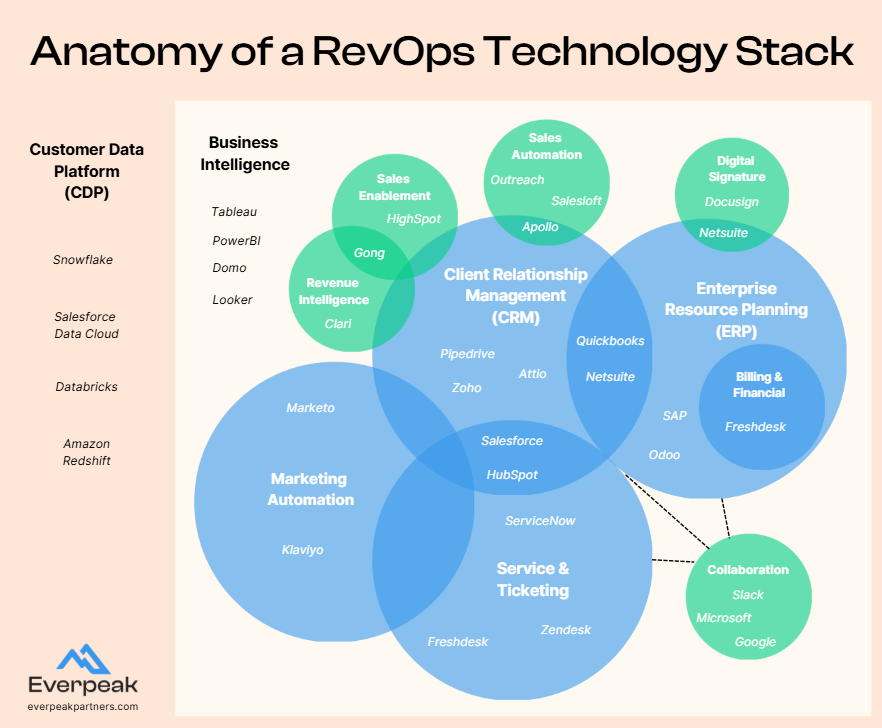Why RevOps gets overly complicated
When you do not have the foundational elements of a Revenue Operating system in place, adding more tools just makes the old ones less effective.
Below is how Everpeak approaches the major software categories, followed by a visual with some software examples in each. NOT an exhaustive list. But this can help you understand why simplifying the processes, data and integrations is essential.

Foundational Elements
These are the areas you must get right before the larger system can work. The system may only be 2 or 3 of these circles, but we usually start with the CRM since that is where the customer data lives.
Client Relationship Management (CRM)
CRM systems centralize customer data, interactions, and history in a single platform. They allow sales, marketing, and service teams to track leads, manage accounts, monitor deal progress, and nurture customer relationships. Companies use CRM to improve sales efficiency, increase retention, and gain insights into customer behavior, ultimately enabling more informed, data-driven business decisions.
Enterprise Resource Planning (ERP)
ERP platforms integrate core business processes such as supply chain management, human resources, inventory, procurement, and manufacturing into a single system. By providing a unified view of operations, ERPs enhance efficiency, reduce errors, and improve collaboration across departments. Companies leverage ERP to streamline operations, maintain accurate financials, and scale operations while keeping all departments aligned.
Service & Ticketing
Service and ticketing platforms enable businesses to manage customer support inquiries efficiently. They provide tools for logging tickets, tracking resolution progress, automating workflows, and maintaining knowledge bases. Companies benefit from faster response times, improved customer satisfaction, and better tracking of service metrics, helping to retain customers and reduce churn.
Marketing Automation
Marketing automation tools allow businesses to automate repetitive marketing tasks such as email campaigns, social media posting, lead nurturing, and segmentation. These platforms provide analytics and reporting to measure campaign performance and optimize outreach. Companies use marketing automation to increase engagement, drive qualified leads, and maintain consistent messaging across channels while reducing manual effort.
Billing & Financial
Finance systems manage core financial operations, including accounting, invoicing, payroll, budgeting, and compliance. They provide real-time insights into financial health and facilitate accurate reporting and forecasting. Companies rely on finance tools to ensure compliance, control costs, streamline transactions, and make strategic decisions based on accurate financial data.
Revops Catalysts (green)
These are the areas that can really propel your team's efficiency, management's visibility, client retention and new client revenue.
Sales Automation
Sales automation platforms streamline repetitive sales tasks such as follow-ups, lead scoring, pipeline updates, and outreach tracking. By automating these processes, sales teams can focus more on building relationships and closing deals. Companies benefit from higher sales productivity, reduced human error, and faster revenue cycles.
Sales Enablement
Sales enablement tools equip sales teams with the resources, content, and guidance needed to sell more effectively. They provide access to playbooks, training, coaching, and relevant collateral, often integrated directly into the CRM workflow. Companies use sales enablement to accelerate onboarding, improve rep performance, and ensure consistent messaging across the organization.
Revenue Intelligence
Revenue intelligence platforms analyze sales activities, pipelines, and forecasting data to provide actionable insights and predictive analytics. They help identify trends, bottlenecks, and opportunities for revenue growth. Companies use these insights to make better strategic decisions, improve forecast accuracy, and optimize the overall sales process.
Digital Signature
Digital signature tools enable secure, legally binding electronic signing of contracts, agreements, and other documents. They streamline the signature process, reduce turnaround time, and maintain compliance. Companies leverage digital signature platforms to accelerate deal closure, reduce paper-based inefficiencies, and improve the overall customer experience.
Data Catalysts
This gets advanced but still very much applies to mid-market companies. It is the data underpinnings that can create sustainable competitive advantages and "moats" around a business.
Customer Data Platform (CDP)
CDPs consolidate customer data from multiple sources into a single, unified profile. They provide segmentation, personalization, and analytics capabilities that allow companies to deliver more targeted marketing and sales campaigns. By using a CDP, companies can better understand customer behavior, improve engagement, and drive higher lifetime value.
Business Intelligence (BI)
BI platforms collect, process, and analyze business data to produce actionable insights through dashboards, reports, and visualizations. They enable companies to monitor key performance indicators, identify trends, and make data-driven decisions. Businesses use BI tools to improve operational efficiency, optimize strategies, and measure the impact of initiatives across departments.
Collaboration
Collaboration platforms facilitate teamwork and communication across departments and geographies. They provide tools for chat, file sharing, video conferencing, and project management. Companies leverage collaboration tools to enhance productivity, streamline workflows, and foster real-time communication, ensuring teams can work together effectively regardless of location.
About Everpeak
Founded in 2017, Everpeak helps organizations win more deals and operatesmarter by leveraging their technology, data and people.
The Revenue Climber
Everpeak’s bi-weekly newsletter offers revenue leaders free How-To guides, software recommendations, and practical frameworks for scaling operations.
.png)
